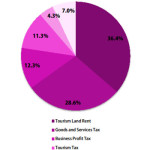The growing dollar shortage in the Maldives has raised alarm among several commodity import businesses operating in Male’ today, after at least one bank ceased to allow the free transfer of rufiya into dollar accounts.
“The problem we have is that local buyers pay us in rufiya, but our bank has now stopped allowing us to transfer this into our US dollar account,” the manager of one enterprise told Minivan News today.
“Our overseas suppliers have to be paid in dollars. How are you meant to run a business in this place? Surely they can’t go on like this?”
The Maldives grapples with a foreign currency deficit due to a heavy import-export imbalance. Goods from overseas must be purchased with foreign currency, but the Maldives has little ability to earn this outside the resort industry.
This industry typically pays salaries in local currency, while commercial banking is conducted outside the country. As a result the wider Maldives economy sees few of the dollars that tourists bring into the country, aside from what tourists spend in local shops and the little that can be extracted from a compliant bank.
“Currently the resort owners and wealthy businessmen bank overseas,” Press Secretary for the President Mohamed Zuhair explained, adding that this was largely due to a lack of trust in the local banking system.
“There is a lack of trust in the government, insecurity, and fear of things like seizure,” Zuhair said, noting that the government was “trying to promote that trust.”
An unwillingness among the banks to sell dollars for local currency does little to promote this confidence, with many banks imposing withdrawal limits even on dollar accounts. Earlier this week local media reported that average daily withdrawal limits had fallen from US$500 to US$200, effectively denying account holders access to their own money.
This, and a distrust of the banks, leads many Maldivians keep their savings privately – effectively ‘under-the -mattress.’
“A lot of money that should be in circulation is not being circulated, because people keep their savings privately,” Zuhair explained.
Companies forced to deal with suppliers in dollars are compelled to use the black market, which currently sells at Rf13.5-13.35 to the dollar (the rufiya is pegged at 12.85), making access to foreign exchange a matter of ‘friends and connections’. Most people with a local mobile phone will have received circulated text message appeals for dollars in the event of a emergency requiring air travel and overseas hospital fees.
Large currency events such as the donation of Rf9 million in relief aid to Pakistan have a further impact, with one government official observing to Minivan News that the quantity of money raised to assist Pakistan flood victims had reached a size where it would have a visible effect on the economy, even if enough dollars were to be found.
“Given the small size of our economy that amount of money will have an impact. It doesn’t make a difference that it is in dollars,” he said.
“On the one hand we have a currency situation to manage, on the other hand there is a humanitarian cost. Neither answer is politically correct.”
Zuhair noted that the country’s foreign currency income was pegged to foreign grant assistance and foreign investment, “both of which are improving.”
“The government has forecast it will receive $90 million this year in donor pledges, soft loans and grants, which I believe will improve the situation.”
Banks have increased the debit limit imposed on Maldivians travelling overseas, from US$200 to US$600, he said.
Moreover, the dollar shortage was seasonal and typically at a peak before the tourism industry’s high season, he said, due to begin in the next couple of months as winter hits Europe.
But for companies buying in dollars and selling in rufiya, the inability to trade legally in currency is hardly an incentive for further investment. Such companies are forced to rely on the unpredictable black market – or bank overseas, and perpetuate the problem.






Rufiyaa is just like toilet paper with no economic value printed and circulated for the peoples to buy dollars which has an economic value to an extent which exceeds far too much than dollar income. It is obvious in this situation there will be no dollars left in the country. Who controls the Maldivan financial market is obviously some bunch of crazy idiots. Ultimately this country is going to bankrupt.
Shortages are the result of price controls below the market clearing price. Whats true for food, clothing, housing etc is also true for currency.
Its pretty clear that one could buy thousands of USD in black market for higher rate than the pegged one.
It will be only a matter of time before the government let go of pegged currency. The peg is not sustainable.
Why the MMA is not saying anything officially about this. or doing anything about this?? This is an issue which is connected to the bread and butter of every Maldivian irrespective of rich or poor.
I have heard from colleagues in tourism industry that irrespective of the percentage of foreign exchange earned by the resorts, the percentage of USD earning has been dropping for the past 2 years.
This is something MMA and the banks need to think and make necessary regulations. We know for a matter of fact that many resorts have contracted the Tour operators from continental Europe in Euros and those from Britain in Pounds. This means a substantial percentage of currency notes and bank transfered received into Maldives is now received in Euros and GBPs. This naturally means there will be a shortage in USD supply.
Also given the nature and countries from where Maldives import goods traders need to pay in USD. Also some people are still not confident in using Currencies other than USDs.
One solution to this forex problem could be, adopting other foreign currencies such and Euro and Pounds in the banking system. This means public should be given choice to open and operate and issue cheques in MRF, USD, EUR and or GBP. Unless we do this there will be a shortage of forex.
Also it is important for traders to re-negotiate with their suppliers to pay in currencies other than USD. So that they could pay in either Euro or another currency.
Maldives is facing similar problems faced by Seychelles about 5 years back. There were very strict forex measures in placed in Seychelles about 4-5 years back. However after adopting Euro as the national base currency and also allowing free float of all currencies it has helped Seychelles Economy to prosper and today it is much easier in Seychelles to obtain foreign currency than in Maldives. There are many similar lesions we can learn from many countries.
WE NEED AN ACTIVE CENTRAL BANK to solve all these problems.
With public salaries followed closely by inflation going through the roof in recent years, MRF12.85 is worth many many times less than what it was worth 5 years ago. For simplicity, lets just say 1USD has not changed its value over the last 5 years (it will have fallen in value a bit over the five years but not as much as MRF so the effect is still the same). So why would a sane person want to give away their $1 for your 12.85MRF today?
The government will have to devalue MRF to relieve dollar shortage but that will initially cause even more inflation. This is all part of life which has been exagerated by the exploded public salaries towards the end of Maumoon's era.
This is very lucrative business and no one has the balls to set it right or utter a word!
When police become the thief ???????
The MMA or the Central Bank is clueless. There are no active policies in place to help this inbalance.
The Maldives simply imports far too much, much more than it can afford. The dollar shortage will inevitably result in less imports, which will be a good thing in the long term.
We have to learn to live within our means. The lifestyle of everyone in this country is like that of a 1st world nation. Luxury goods, top brand mobile phones, luxury cars etc. Reality is that this is a very very poor 3rd world country.
You are all clueless. You have no idea how to manage a your currency. First of all your balance of trade is in the wrong direction to have a pegged currency at all. Secondly you have no idea how to make a budget and stick to it.
You like to blame the government but guess what? The government is made of the people. And when the people (in this case Maldivians) are a bunch of dumbasses you get what you deserve!